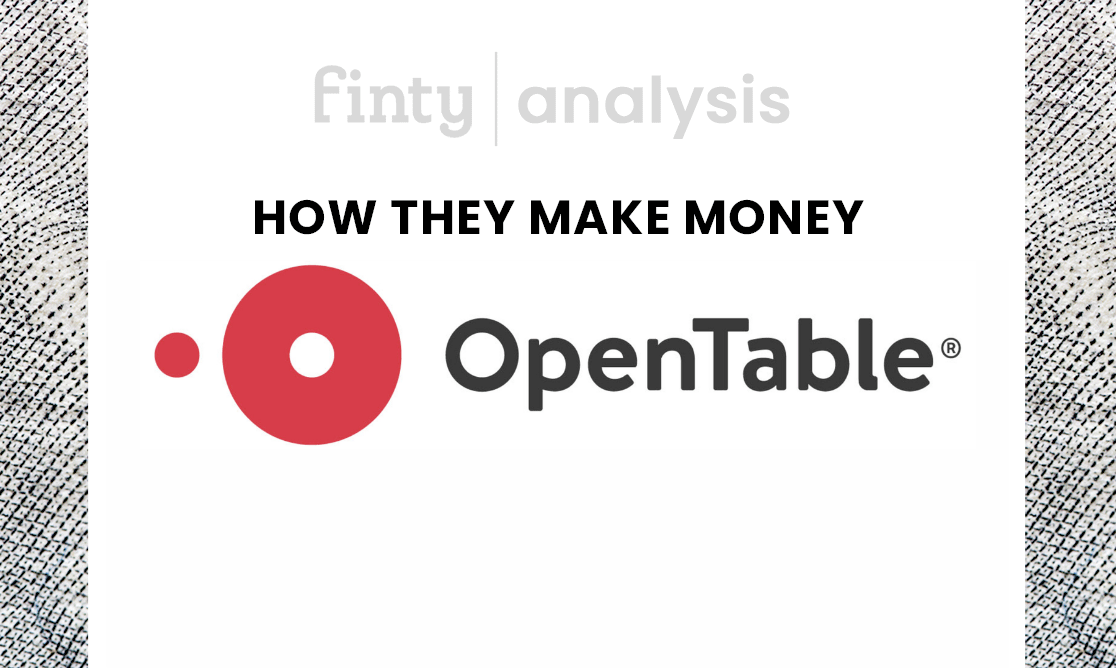- OpenTable is an app allowing users to book reservations at restaurants in their local area.
- The app enables users to book tables and pay for their food, all on one user-friendly platform.
- OpenTable makes money by charging a subscription, booking, service, and referral fees.
OpenTable is the market leader in online restaurant reservations in the US. Templeton got the idea for the platform after waiting nearly three hours to get a table at his wife's favorite restaurant.
Eric Moe, Chuck Templeton, and Rishi Deshpande founded OpenTable in 1998, and the company has its headquarters in San Francisco, California.
The company went public in 2009 on the Nasdaq exchange under the ticker $OPEN. Its IPO sold 3 million shares at $20 per share, and Booking Holdings acquired the company in 2014 for $2.6 billion in an all-cash deal.

Coming up next
What does OpenTable do?
OpenTable is an app for mobile devices, available for iOS and Android users.
The firm launched in Chicago and San Francisco, offering its software as a service (SaaS) solution to help people get reservations at their favorite restaurants.
The company experienced rapid growth, with more than 750 restaurants across 15 cities signing up for the platform by 2000.
OpenTable continued to source funding to continue its expansion across the country. The company launched its iOS app in late 2008 and the Android app the following year.
OpenTable collaborates with other related platforms, such as Yelp!, where it powers the backend of the platform's reservation bookings service.
How does OpenTable work?
OpenTable operates an aggregator business model, meaning it collects data points from its user's restaurant experience.
It gathers information like restaurant and food quality, making it available to its users to make better decisions about where they want to eat.
OpenTable charges partner restaurants and food-related companies for the right to host their business on its platform. In turn, the exposure the restaurants receive from the app brings them more business.
How OpenTable makes money
OpenTable makes money by charging its partner restaurants and food businesses a subscription fee to its platform.
They also earn revenue through booking and service fees and referral fees, and the company also has a dedicated restaurant that generates income.
Subscriptions
OpenTable earns the bulk of its revenues through subscription fees paid by partner restaurants that use its platform.
OpenTable offers three plans, Basic, Core, and Pro, costing users $29, $249, and $449 per month.
Each plan comes with unique features, such as online waiting lists, post-dining surveys, real-time inventory modeling, and others.
Booking & Service Fees
Restaurants sign up to OpenTable and pay their monthly subscription to remain on the platform.
Every time a customer uses the app to book a table, OpenTable charges the restaurant a booking fee for bringing them business.
The charges depend on the restaurant's subscription tier, with the higher levels paying less in fees.
Basic subscriptions charge the restaurant $1.50 per booking.
The higher plans charge $1 per booking. OpenTable also charges a 2% service fee across all subscription plans.
Referral Fees
OpenTable partnered with GrubHub and Uber Eats in 2019.
These companies pay OpenTable a fee when users order food from these companies through its app.
In-Dining
OpenTable launched its dedicated restaurant, "Layla," in 2021.
Based in Miami, Layla offers high-quality food, and OpenTable uses it as a testing ground for introducing new features to its app.
The company earns income through the food it sells, but most of the profits go back into innovation projects.
Future growth engine
OpenTable's future growth engine comes from its use of its Layla restaurant to introduce new concepts to its app to improve the user experience.
The company is currently experimenting with wearables and other IoT devices.
OpenTable plans to use wearable tech to provide a personalized feel to its user experience.
The wearable will give customers the ability to make bookings and check their reservations in real-time.
The device pushes notifications to the user, reminding them about their reservation and other important information pertaining to their booking.
Competitors
OpenTable competes with other restaurant booking apps and online platforms. Some of its biggest competitors in the space include the following companies.
- Eat App
- Tock
- Resy
- Yelp Reservations.
- TableIn
- Eveve
- Table Agent

